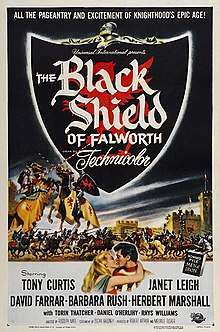The Black Shield of Falworth
The Black Shield of Falworth is a 1954 Technicolor film from Universal-International, produced by Robert Arthur and Melville Tucker and directed by Rudolph Maté. It stars Tony Curtis, Janet Leigh, David Farrar, Herbert Marshall, and Torin Thatcher. The screenplay was adapted by Oscar Brodney and is based on Howard Pyle's 1891 novel Men of Iron. The original music score was composed by Hans J. Salter.
| The Black Shield of Falworth | |
|---|---|
 Theatrical release poster by Reynold Brown | |
| Directed by | Rudolph Maté |
| Produced by | Robert Arthur Melville Tucker |
| Written by | Oscar Brodney |
| Based on | Men of Iron novel by Howard Pyle |
| Starring | Tony Curtis Janet Leigh Barbara Rush Torin Thatcher Herbert Marshall Craig Hill David Farrar Dan O'Herlihy |
| Music by | Hans J. Salter |
| Cinematography | Irving Glassberg |
| Distributed by | Universal Pictures |
Release date |
|
Running time | 99 minutes |
| Country | United States |
| Language | English |
The film was Universal-International's first feature made in CinemaScope. It opened in New York City's Times Square on October 6, 1954 at the Loew's State Theater. It was the second of five feature films in which husband and wife Tony Curtis and Janet Leigh appeared together on screen during their marriage (1952-1961).
Plot
Myles Falworth (Tony Curtis) and his sister Meg (Barbara Rush) live in obscurity on a farm in Crisbey-Dale with their guardian Diccon Bowman (Rhys Williams). This is to protect them from the attainder placed upon their family by King Henry IV of England (Ian Keith) because their father has been (falsely) accused of treason and murdered by the Earl of Alban (David Farrar). When a hunting party comprising the Earl of Alban, the lord of Crisbey-Dale, and another nobleman, Sir Robert, stop at their farm for refreshment, they are repulsed by Myles, who stops them from molesting his sister.
This confrontation accelerates Diccon's plans to send them to Mackworth Castle in Derbyshire (based on the eponymous castle), so that they can come under the protection of William, The Earl of Mackworth (Herbert Marshall), a close friend of Myles and Meg's father. In Myles he sees the man who can finally rid England of the evil machinations of the Earl of Alban. Myles is first trained to be a squire, then as a knight, and is finally knighted by the king. He is successful in killing the Earl of Alban in a trial by combat, foiling Alban's attempt to seize the English crown. Myles, having fallen in love with the Earl of Mackworth's daughter while staying at the castle, is finally able to propose marriage to the Lady Anne (Janet Leigh) after he has proven his mettle. The Earl gives his hearty consent, and the two families are joined.
Cast
- Tony Curtis as Myles
- Janet Leigh as Lady Anne
- David Farrar as Gilbert Blunt, Earl of Alban
- Barbara Rush as Meg
- Herbert Marshall as William, Earl of Mackworth
- Torin Thatcher as Sir James
- Daniel O'Herlihy as Prince Hal
- Patrick O'Neal as Walter Blunt
- Craig Hill as Francis Gascoyne
- Ian Keith as King Henry IV
- Doris Lloyd as Dame Ellen
- Rhys Williams as Diccon Bowman
- Leonard Mudie as Friar Edward
- Maurice Marsac as Count de Vermois
- Leo Britt as Sir Robert
- Charles Fitz Simons as Giles
- Gary Montgomery as Peter
- Claud Allister as Sir George
- Robin Camp as Roger Ingoldsby
- Harry Cording as Captain of King's Guards
- Nicolas Coster as Humphrey, Young Squire
- Charles Evans as Lord Archbishop
- Richard B. Fitzgerald as Sentry
- Lance Fuller as Guard
- Brett Halsey as Young Squire / Apprentice Knight
- Chuck Hamilton as Court Observer
- Ramsay Hill as Sir Charles
- Bob Hoy as First Guard
- Nelson Leigh as Archbishop at Myles' Knighting
- James Logan
- Ralph Moratz as Court Knave
- Damian O'Flynn as Sir Alexander
- Reginald Sheffield as Lord Constable
False quotation
The film is famous for an apocryphal line, attributed to Tony Curtis and rendered as "Yonda stands da castle of my fodda" or similar. The plot details above show that this would not fit the story: there is no "castle of my father". The line is said to have come from a remark made by Debbie Reynolds on television.[1] Life magazine attributed the line to Curtis while performing in the 1951 film The Prince Who Was a Thief.[2]
This chestnut used to be quoted in Radio Times whenever the film was on BBC television, and found its way into a 2007 study by Clive James of Tony Curtis's work. Curtis has denied ever saying that line, but he did actually say a similar line in the film Son of Ali Baba, released in 1952 (and one of two "Arabian Nights" style film fantasies he made with Piper Laurie), that reads, "This is the palace of my father, and yonder lies the Valley of the Sun", and he did deliver it on screen with a markedly New York accent.[3]
References
- Harry Purvis and Clyde Gilmour, Leisure Ways magazine, 1980s.
- "Beeyoody-ful Life of a Movie Caliph". Life. November 17, 1961. p. 170.
- Adam Kirsch, Jewish Journal, December 30, 2008